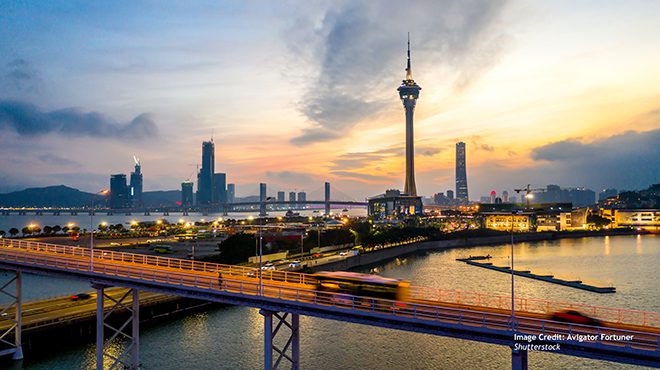Macau’s Moment: China’s Other Special Administrative Region

While demonstrations in Hong Kong have grown in scope and intensity this summer, little attention has been paid to China’s other former European colony turned Special Administrative Region (SAR); Macau. Much has been made of the many anniversaries China is marking this year, whose political leaders are very conscious of political symbolism: 100 years since the May Fourth Movement demonstrations, 70 years since the founding of the People Republic of China, etc. Far less remarked upon, at least until now, has been the twentieth anniversary of the handover of Macau from Portugal to China.
An Example to Follow?
In 1999, when the Portuguese lease on its overseas holding expired, the 1997 reintegration of Hong Kong appeared to demonstrate the benefits of the “One China, Two Systems” model. The prosperity gained through unification with the Mainland was enticing, and an apparent willingness of the Communist Party of China (CPC) to maintain the unique administrative system of the former British colony served as an enticing example for Macau to follow.
Since the opposition to a proposed extradition bill has spiraled into a larger movement calling for increased suffrage, the Hong Kong experience may again serve as an example, albeit of a different type. In Taiwan, the upheaval in the former British colony and the CPC-backed administration’s response have done little to encourage faith in ostensible autonomy that unification with the Mainland might bring to the de facto self-governing island.
For Macau, whose economic, social and political traditions differ significantly from both its fellow SAR counterpart across the bay and those of Taiwan, the impact of the turmoil in Hong Kong is being felt indirectly.
The Make-up of Macau’s Politics
As the issue of judicial sovereignty and disaffection with the Beijing-backed Chief Executive of Hong Kong, Carrie Lam, drove unprecedented numbers onto the streets, Macau’s establishment quietly nominated a new candidate for Chief Executive.
Like Hong Kong, Macau’s legislature is a made up of elected and appointed legislators. While 14 of the assembly members are subject to popular mandates from voter constituencies, 12 of the assembly members represent special interest groups such as the labor and business unions, while a further seven members are directly appointed by the chief executive.
This latter block is especially effective at ensuring cohesion between the Legislative Assembly and the Chief Executive, as appointed members do not have party affiliations. Macau’s election system is structured around a proportional representation system employing party lists, which creates a plurality of different parties and allows for the existence of a pro-Democracy camp, but also generates a fractured legislative landscape. Thirteen political parties are represented in the Assembly, controlling 26 seats. Appointees whose loyalties primarily lie with the administration of the Chief Executive can thus form the largest individual block within the legislature.
A further peculiarity is that Macanese society and government are infamously tied to the gambling industry, which has benefited immensely from the rising levels of prosperity in Hong Kong as well as Mainland China. Following the sweeping anti-corruption campaign that Xi Jinping introduced in 2015, however, Macau’s GDP decreased by 25 percent, illustrating just how central graft within the Chinese bureaucracy had become to the former Portuguese economy. This also showcases how intimately tied Macau is to the policies of the CPC, which reserves the right to approve (or veto) any decisions taken within the political system.
The Machiavelli of Macau?
Politics in the Macau SAR follow a set five-year cycle, with a chief executive’s term of office subject to a two term limit. With the twentieth anniversary of the reunification with the Mainland the establishment of the PRC’s second Special Administrative Region (SAR) on December 20, 2019, approaching, a 400-member electoral college, largely established by Macau´s government, has appointed former Legislative Assembly Spokesman Ho Iat-seng as their choice for Macau’s top post. With close ties to the CPC establishment and roots in the Macanese business establishment Ho´s nomination was almost certain to take place. While at least five other candidates, some of which present themselves as outspoken democrats, announced that they would be running, none passed a pre-selection stage manded by law, and enacted by the electoral college itself.
Born into an industrialist family originally from Zhejiang, Ho himself is known primarily for his business career. Nevertheless, he has racked up over two decades of political experience on both the Mainland and in the SAR with stints in the Chinese People’s Political Consultative Congress (CPPCC) and as well the National People’s Congress (NPC). Ho is a fixture of the Macanese establishment, serving on the executive Council from 2004 and becoming a member of the Legislative Assembly in 2009 with a functional constituency mandate. Ho’s ascendancy in Macau came after a burgeoning career as a CPPCC member in Zhejiang 30 years earlier, where he rose rapidly through the ranks to become the legislature’s president.
Although Ho has generally avoided appearing the media, he has gone on the record to condemn protests in Hong Kong, as well as Macanese solidarity demonstrations in support of Hong Kong’s suffrage movement, and has stated that his administration will pursue closer ties with Beijing. While he hails from the ranks of Macau’s leading families, he differs from his predecessors in that he has comparatively few obvious ties with the gambling industry. The licenses for some of the leading Macanese casinos, which are a staple of the SAR’s economy are coming up for renewal during his prospective tenure and there has been much speculation about the potential for a change in course in the gambling hub.
The SAR is also likely to be hit hard by the trade war with the U.S., as well as a potential slowdown of the Chinese economy during a looming global economic recession. Upon assuming office at the end of the year Ho will have to contend with livelihood issues in Macau and will have to navigate between whatever modus vivendi Beijing and Hong Kong embark upon in the near future.